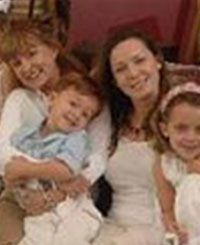Reassessing the Postponed Life
By Wendy Reid Crisp
Editor in chief, GRAND magazine
A remote branch of the maternal side of my family recently compiled a genealogy and forwarded the report to my mother and me. The first thing I noticed were the errors: sons with names similar to fathers\’ and grandfathers\’ were confused; multiple marriages were tossed into bizarre salads of names and lineages.
The second thing I noticed was that my grandmother was born in 1872. Two of her children, one of whom is my 94-year-old mother, are still living, as are my sisters and I, my sons and my grandsons. The math on this is what drew my attention: My grandsons have a great-great-grandmother who was born 136 years ago.
Last week, our local newspaper ran a five-generation photograph. I spent a long time looking at that picture: the great-grandmother was a school friend of mine; her mother, the great-great-grandmother, had been an authority figure when I was a child. When she said to quiet down, we shut up and behaved. I now realize that at that time she was 24.
The family of my school friend had fit an entire generation into the vast plains of my family\’s procreations.
There was a time when I thought time was endless, when having a family was something I would consider after I had done everything I wanted to do (the young find it difficult to believe there are still things we want to do post-40), when my career was stable (another myth), when I had the patience of maturity (something I acquired around 50 and have since lost).
No one told me that I was giving up something that, in any case, I would not have appreciated: the chance to fill my midlife years with grandchildren\’s soccer games, dance rehearsals and school plays. Or, the possibility of seeing my grandsons (who are 4 and 2) graduate from college and marry. I have to accept that, unlike my school friend, it is unlikely I will ever hold my great-grandchild.
For me, these would not have been compelling arguments for giving birth in the late \’60s or early \’70s. When I looked around then at the lives of the young women I knew, the ones who married after high school graduation—or even (scandalous, then) before—I saw nothing appealing, nothing new: Their lives had quickly become junior versions of the lives of their mothers. Heaven forbid I should spend my youth making meatloaf and folding laundry.
And so I didn\’t—a choice made by millions of other women in those years and since. (Currently, the average age of a mother giving birth for the first time is 25.1 years, the highest average ever recorded, according to the U.S. Census Bureau; and 100,000 women over 40 are first-time mothers.)
I\’m grateful for the consequences of my choices, the successes and the failures; the mistakes, big and little; the friends, good and bad – I\’m humbled by the unearned joy I\’ve had from my son and – although I don\’t see them often enough! — my grandsons. Along the way, I\’ve also been graced with the company of non-biological children and grandchildren.
We war-babies and early boomers, at the fore of the woman\’s movement, struck with the promise of “having it all” while being warned we\’d have to “juggle,” have come into grandmotherhood with the same passionate commitment with which we tackled wars and racism and discrimination and …folding laundry.
We know we\’re going to savor these best years of our life.
Even if we wish we\’d started sooner.



Leave a Reply
You must be logged in to post a comment.